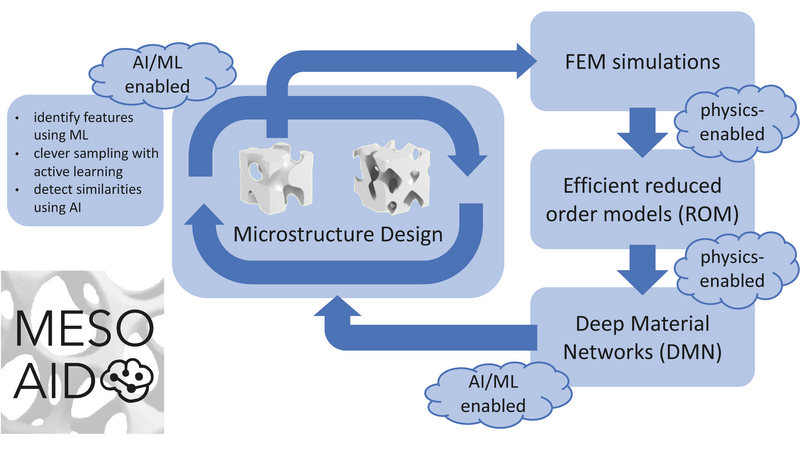
In this trilateral project, the very challenging problem of inverse microstructure design in the presence of dissipative nonlinear material behavior is addressed. One goal is the synthesis and parameterization of microstructures. Involved simulations lead to quality datasets that are the foundation for reduced order models (ROM) in order to leverage the amount of data. This data will then be used to train Deep Material Networks (DMN) that can interpolate the behavior across microstructures. The inverse design of materials based on the DMN, the reconstruction of the full microstructures, and their validation through simulation are the ultimate goal. The PP will generate important datasets. It will also require dedicated workflows to deal with the hierarchy of different models and inputs to be used.
| Acronym: | Meso-AID |
| Website: | https://gepris.dfg.de/gepris/projekt/530808823 |
| Contact: | Prof. Dr.-Ing. Felix Fritzen, University of Stuttgart |
| DFG Classification: | 4.12-02 - Mechanics |
| Material/ Methodology: | elastoviscoplastic composites (synthetic materials); microstructure design |
| Engagement: | 3 FTE scientists (3 institutions; 3 PIs) + surrounding groups are invested in Meso-AID |
NFDI-MatWerk
Funded by the Deutsche Forschungsgemeinschaft (DFG, German Research Foundation) under the National Research Data Infrastructure – NFDI 38/1 – project number 460247524.
NFDI-MatWerk
Funded by the Deutsche Forschungsgemeinschaft (DFG, German Research Foundation) under the National Research Data Infrastructure – NFDI 38/1 – project number 460247524.
Subscribe to our newsletter for regular updates about materials science topics!
After subscribing, you will receive an email from us with a confirmation
link.
Only after clicking this link your registration is completed.